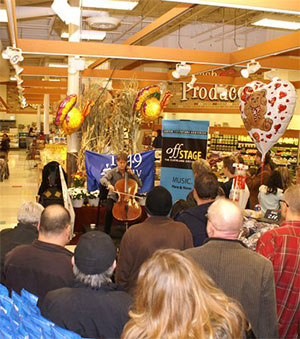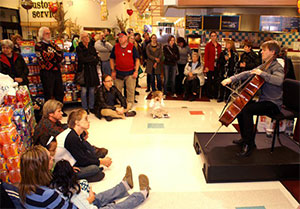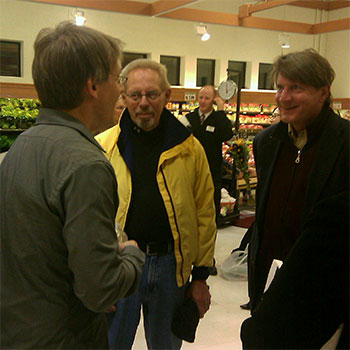by Daniel Hathaway
41-year old German cellist Alban Gerhardt is in town to perform Matthias Pintscher’s Cello Concerto with the Cleveland Orchestra, but he made his first public appearance on Wednesday evening in the fruit and vegetable section of Dave’s Supermarket in Ohio City, playing Bach unaccompanied cello suites for a group of onlookers and listeners that swelled to about a hundred adults and children during his 5:30, hour-long performance.
Alban got the idea of doing impromptu solo performances in unexpected places from his experience last July playing all six of Bach’s solo suites in the Radialsystem, an experimental venue in Berlin. As he writes in his blog, “I thought the Bach suites were a bit too complex and not exciting enough for an ‘untrained listener'”, but “a friend of mine attended the concert together with a gentleman who had never listened to classical music in concert before and who was so taken by the beauty of Bach’s music that he didn’t mind sitting relatively still for almost three hours”.
Mental wheels began turning, and Alban and his friend imagined other ways of delivering this music to people who didn’t know it belonged to them. They recalled an MTV experiment in the 90’s in which pop groups would appear in the morning on German radio stations and reveal their intentions to perform that night, asking the audience to suggest places where the concert could take place.
Alban’s version was “a little spontanenous radio-tour with Bach in Northern Germany” which produced solo appearances in a wine cellar, in a maternity ward for a new-born baby, after a youth orchestra rehearsal, for a dozen teenaged girls before a musical theatre company rehearsal, at a gym, for a group of anti-nuclear-waste activists at an alternative coffee house and in the music salon of a Cuban cellist.
Alban Gerhardt found the experience transforming. “The intimacy of solo cello or chambermusic for that matter can only be experienced at its best in small venues such as living rooms, small cafés or maternity wards. The power of music is so much stronger when experienced within couple of inches away from the artist and not separated by a stage and meters of distance”. He was determined to try it out during his time in Cleveland as well and sought the support of The Cleveland Orchestra.
Although Alban made a morning appearance on WCLV, playing and being interviewed by Jacqueline Gerber, and took listener suggestions about promising local venues, the Orchestra had already brainstormed a suitable place, approaching Dave’s Supermarket in Ohio City about a drivetime event in a setting where a cello recital would be an unexpected happening. Store manager Dave Stueve (but not “the” Dave, although he has worked for the chain for 31 years) was immediately receptive and thought the event would be perfect for his very eclectic constituency. “I didn’t have to think about it for a minute”.
So it came to pass that we found ourselves standing next to WCLV’s Robert Conrad and a pile of potatoes, listening to a ravishing performance of Bach’s music which drew a crowd of people who obviously came for the occasion and offered a surprise for shoppers who wandered in with their carts and kids to replenish their larders. Some of the latter were curious and stopped to listen; some went right on about their errands.
Alban, situated under banners identifying the sponsors of the event, WCLV and The Cleveland Orchestra (especially its new Center for Future Audiences) — as well as an inflated mylar balloon in the shape of a turkey, performed with the same closed-eyed intensity he would for any concert hall audience while Dave Stueve passed through the crowd handing out complimentary glasses of wine.
In a chat with the affable cellist following the performance, Alban spoke of his enthusiasm for putting his spare time to good use when he comes to do a major solo gig by bringing the music he loves out into public places to share it with the uninitiated. “I know very well-paid soloists who wouldn’t think in this way”, he allows, mimicing the nose-in-the-air attitude that prevails in a lot of classical music circles.
Events like Bach at Dave’s are still in the experimental stage and understandably can feel a bit unspontaneous. But the more often people can experience “classical” music as part of their everyday lives, the more “relevant” it will become. In our era, when most “serious” music is encountered in dedicated concert halls, it’s easy to forget that once music moved away from royal patronage and began to be supported by a rising bourgeoise class, the art form was delivered to its public in churches, coffee houses and taverns. J.S. Bach devoted much of his time to producing weekly concerts at Zimmerman’s Coffee House in Leipzig in the 1740’s, and in 1744, the “Grosses Concert” in that same German town moved from performances in private houses to the Three Swans Tavern, where it played for more than three decades before the city fathers renovated a floor in the Gewandhaus for the ensemble and gave it its current name. Later in the nineteenth century when middle class patrons began imitating the aristocracy they had replaced, concert halls were built and became temples to music, if not music’s museums.
Thus enterprises like Classical Revolution Cleveland and Orchestral Manoeuvres at The Dog are attempts to rediscover the charms of presenting music in everyday places like pubs and bars. Of course, concert halls will always be important places to hear music, and not everything is so portable as a solo cellist or as durable and captivating as the music of J.S. Bach, but the surprise of encountering music in unusual places — especially when different venues contribute to the intimacy of the experience — will continue to become more and more important in our cultural lives. Bravo to Alban Gerhardt for his initiatives in that direction. We hope local musicians will catch his enthusiasm and brainstorm projects of their own.






